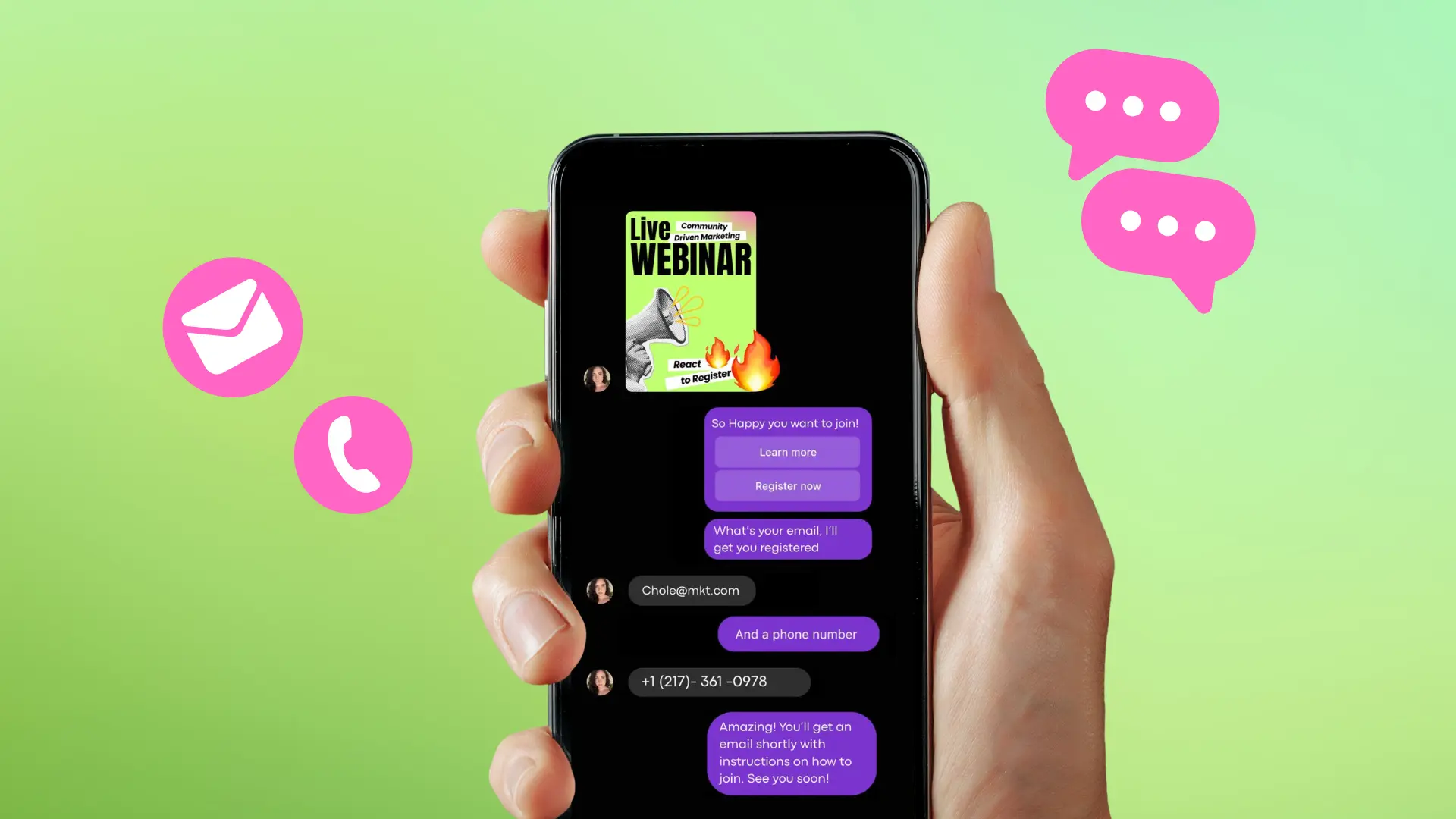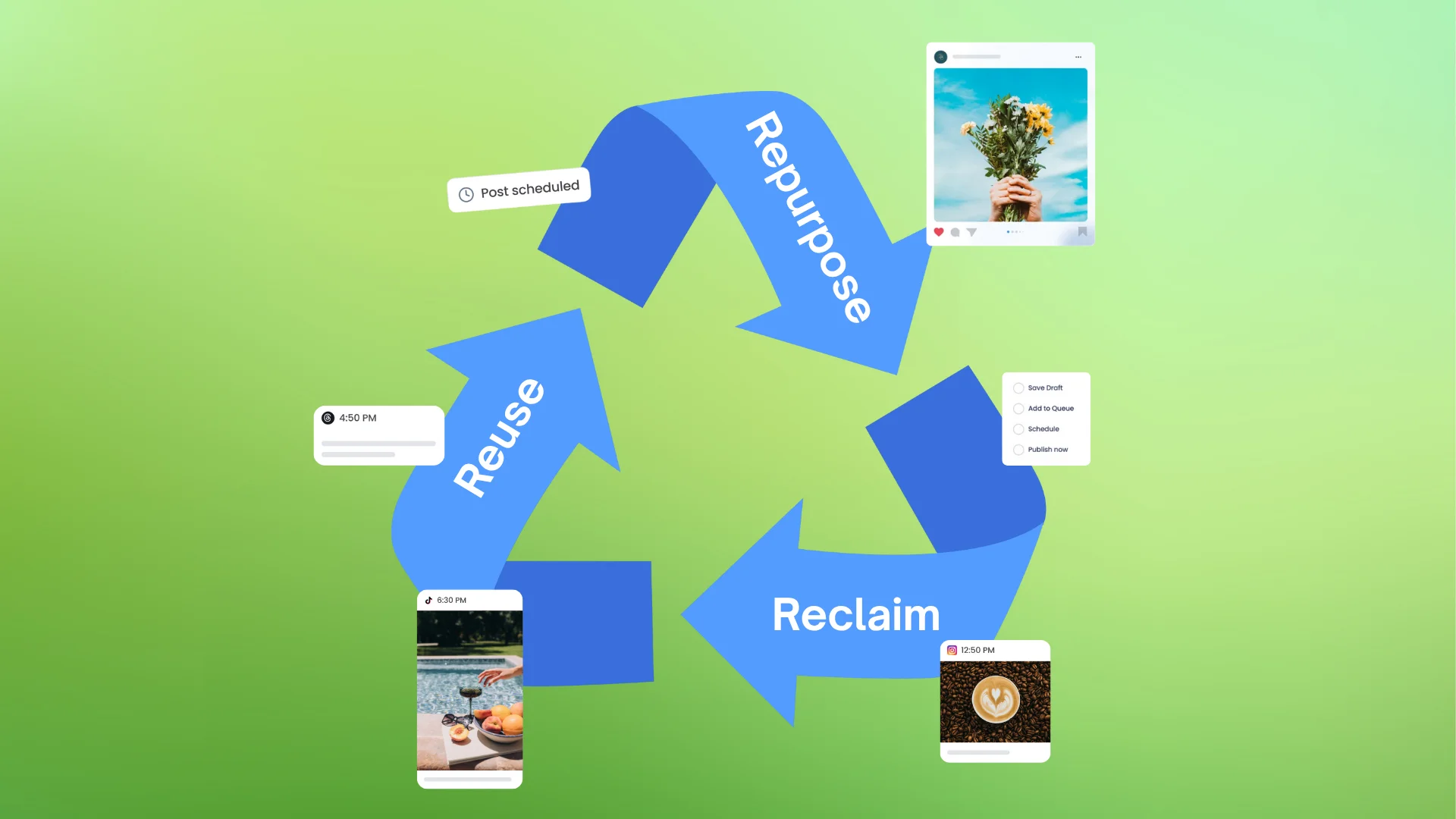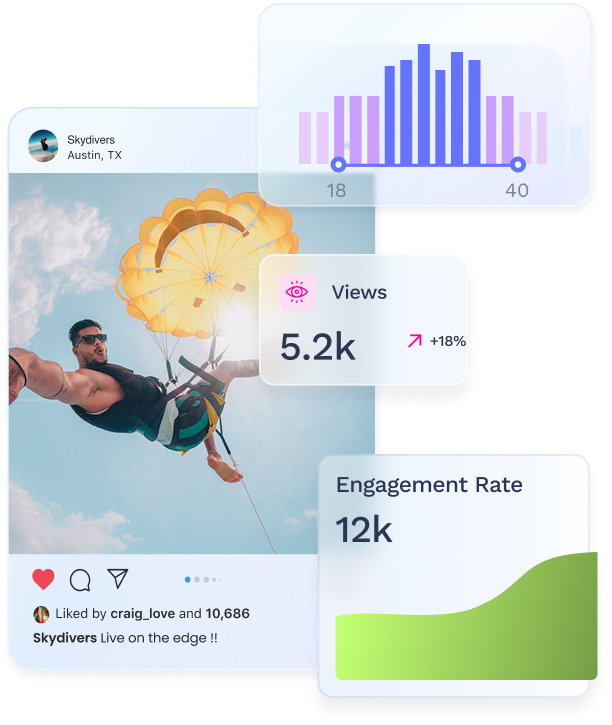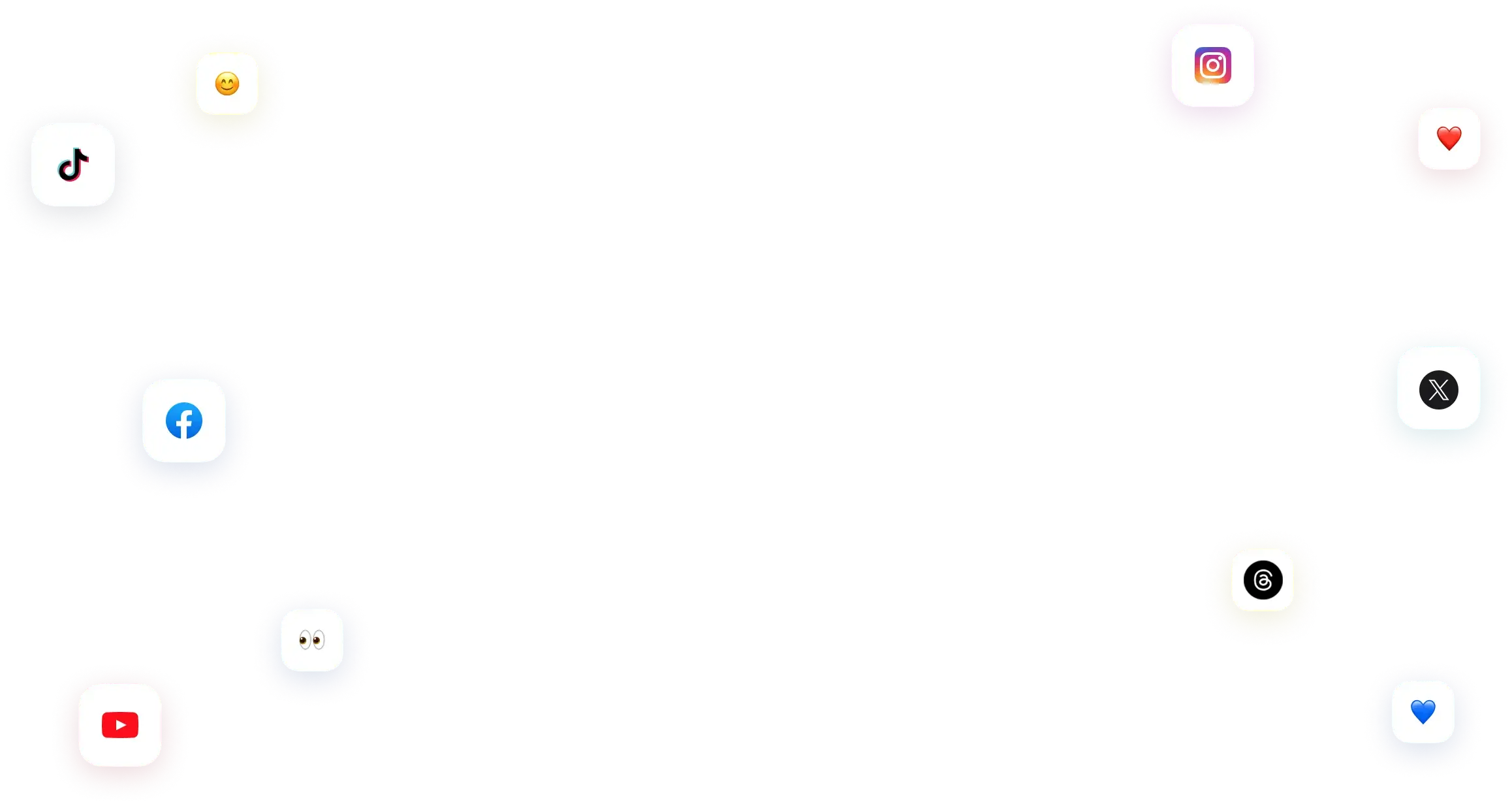New

Turn Your DMs Into Lead Gen!
Learn how to collect lead data from your DMs such as email addresses, phone numbers, and more right from your social inbox. If you are not yet automating your DMs your competitors are outpacing you.

How Something Social Saved 75% of Their Time and Increased Revenue by 15%
See how a fast-growing agency improved operations, cut down hours of manual work, and unlocked new revenue opportunities with Vista Social.
New

50 Unique Social Media Ideas for Consistent Content Creation
Discover 50 unique social media post ideas to engage your audience, grow your brand, and maintain a consistent content strategy with ease!

Mastering Content Reuse: The Key to a Consistent and Sustainable Posting Strategy
Published on August 8, 2025
7 min to read
How Social Media Crisis Management Saves Your Brand
Summarize with AI

Summarize with AI
ChatGPT
Claude
Perplexity
Share
Vista Social
X (Twitter)
Table of contents
Summarize with AI
ChatGPT
Claude
Perplexity
Share
Vista Social
X (Twitter)
A single social media misstep can cost your company $4.3 million on average. However, effective social media crisis management offers a different path forward. Research shows that companies investing in proactive crisis management programs achieve 300-600% ROI by avoiding devastating financial losses and reputation damage.
In 2025, with social media crises escalating faster than ever, comprehensive crisis management isn’t just smart risk mitigation—it’s essential business strategy. Furthermore, only 24% of companies have implemented social media policies, leaving the vast majority vulnerable to brand-threatening incidents.
But why exactly has social media crisis management become so critical for protecting your brand’s future?
Table of contents
What is Social Media Crisis Management?
Social media crisis management encompasses both proactive prevention strategies and reactive response protocols designed to protect brands from social media-driven threats. Unlike traditional crisis management focused on post-incident damage control, modern social media crisis management emphasizes early detection, rapid response, and strategic communication across digital channels.
The approach matters enormously for your bottom line. Effective social media crisis management combines monitoring systems, response protocols, and recovery strategies to minimize damage and protect brand equity. Additionally, comprehensive crisis management maintains narrative control rather than allowing external forces to define your brand’s story.
Modern social media crisis management includes real-time monitoring across platforms, sentiment analysis, content approval workflows, employee training programs, and pre-developed response strategies. Furthermore, brand reputation accounts for 63% of company market value, making crisis management a direct business imperative.
Current social media risks in 2025 include viral misinformation, employee policy violations, algorithmic amplification of negative content, coordinated attack campaigns, and AI-generated fake content targeting brands. These threats move at unprecedented speed, making comprehensive crisis management the only viable defense strategy.
The Real Cost of Social Media Crises
The financial devastation from social media crises extends far beyond immediate revenue losses. Research reveals that the average social media crisis costs companies $4.3 million, breaking down into specific damage categories that compound over time.
Direct financial impact includes:
- Brand reputation losses: $638,496 average
- Direct operational costs: $641,993 average
- Lost revenue during crisis: $619,360 average
- Stock price reductions: Over $1 million average
However, the hidden costs often exceed direct expenses. Recovery timelines extend 2-4 years for major incidents, during which companies face sustained revenue impacts, increased customer acquisition costs, and ongoing brand equity erosion. Moreover, Harvard Business Review analysis shows that traditional recovery patterns require 2-3 years before rehabilitation begins.
Recent examples demonstrate these costs in stark detail. Twitter’s transformation to X resulted in a 91% brand value collapse from $5.7 billion to $498 million. The Bud Light controversy cost Anheuser-Busch $1.4 billion in North American revenue, while Target lost $9.3 billion in market cap during its Pride merchandise backlash.
The speed of modern crises amplifies these costs dramatically. Silicon Valley Bank collapsed in just 48 hours after social media-driven withdrawal requests, representing the fastest major bank failure in U.S. history with $16.8 billion in market value completely eliminated.
5 Essential Social Media Crisis Management Strategies
1. Real-Time Social Media Monitoring and Detection
Comprehensive monitoring forms the foundation of effective social media crisis management. Modern platforms track mentions, sentiment, and potential issues across 35+ digital channels, enabling detection within 30 minutes versus hours for manual processes.
Advanced monitoring systems reduce false positives to 0.1-2% compared to 40% for traditional methods. Furthermore, AI-powered tools prevent 60-70% of potential issues from escalating to full crises by providing early warning systems for brand threats.
The key metrics to monitor include mention volume spikes, sentiment shifts, hashtag trends, competitor mentions, and employee social media activity. Additionally, effective monitoring covers indirect mentions, visual content analysis, and cross-platform conversation tracking.
2. Rapid Response Protocol Implementation
Speed determines crisis outcomes in social media environments. Industry benchmarks require acknowledgment within 1-4 hours and comprehensive responses within 24 hours, but leading brands respond within minutes to contain spreading issues.
Successful rapid response protocols include automated alert systems, pre-approved response templates, and clear escalation procedures. Moreover, 76% of consumers expect brand responses within 24 hours, making response speed a competitive advantage.
The most effective systems balance speed with accuracy, enabling immediate acknowledgment while ensuring substantive responses address core issues. Teams should establish emergency approval processes for crisis response content and maintain 24/7 response capabilities for high-risk periods.
3. Cross-Functional Crisis Team Coordination
Effective social media crisis management requires coordinated response across marketing, legal, executive, customer service, and communications teams. Clear role definitions prevent confusion during high-pressure situations while ensuring comprehensive issue addressing.
Essential team components include:
- Crisis commander: Makes final decisions and external communications
- Social media manager: Monitors platforms and executes responses
- Legal counsel: Reviews messaging for compliance and liability issues
- Communications lead: Coordinates internal and external messaging
- Executive sponsor: Provides authority and resource allocation
The most effective teams undergo regular training through simulation exercises, ensuring smooth execution under pressure. Additionally, teams should establish clear communication protocols and decision-making authority to prevent delays during actual crises.
4. Strategic Content and Messaging Management
Content strategy during crises determines long-term brand recovery success. Effective social media crisis management balances transparency with message control, providing accurate information while maintaining brand positioning.
Key messaging principles include acknowledging issues quickly, taking responsibility when appropriate, explaining corrective actions clearly, and demonstrating genuine concern for affected stakeholders. Furthermore, consistent messaging across all channels prevents confusion and builds credibility.
Crisis messaging should avoid defensive language, legal jargon that alienates audiences, and responses that appear scripted or insincere. Instead, focus on human-centered communication that demonstrates authentic concern and commitment to resolution.
5. Post-Crisis Analysis and Recovery Planning
Recovery phase management determines long-term brand reputation outcomes. Comprehensive social media crisis management includes systematic analysis of crisis causes, response effectiveness, and stakeholder sentiment to inform future prevention strategies.
Post-crisis activities should include stakeholder feedback collection, media coverage analysis, financial impact assessment, and process improvement identification. Additionally, recovery planning may include reputation rehabilitation campaigns, stakeholder relationship rebuilding, and enhanced monitoring systems.
The most successful recovery efforts demonstrate genuine learning from crisis experiences through concrete operational changes, enhanced policies, and improved stakeholder communication. Furthermore, transparent communication about improvements builds trust and prevents future incidents.
Vista Social’s Crisis Management Capabilities
Vista Social provides comprehensive social media crisis management through integrated monitoring, response, and recovery tools designed for marketing agencies, freelancers, and social media managers. The platform’s social listening capabilities track brand mentions, sentiment changes, and potential issues across all major social platforms from a centralized dashboard.
Vista Social’s social monitoring features enable real-time detection of potential crisis situations by tracking conversations both within and beyond your social media profiles using specific keywords and phrases. The platform automatically tags conversations with sentiment analysis, helping teams identify negative sentiment shifts before they escalate into full crises.
The platform’s team collaboration features enable rapid crisis response coordination, allowing multiple stakeholders to collaborate on messaging, approve responses, and execute communications efficiently through the shared calendar system. This prevents delayed responses while maintaining message consistency across team members.
Vista Social’s scheduling and publishing tools help maintain regular content flow during crisis periods, ensuring brands can continue positive messaging while addressing crisis issues. Additionally, the platform’s comprehensive analytics and reporting features provide real-time insights into crisis impact and response effectiveness.
The platform’s reporting capabilities enable comprehensive post-crisis analysis, tracking sentiment recovery, engagement changes, and audience response to crisis management efforts. This data informs future crisis preparedness and demonstrates crisis management ROI to stakeholders through automated, customizable reports.
Measuring Social Media Crisis Management Success
Success in social media crisis management extends beyond damage limitation to include response effectiveness, stakeholder satisfaction, and long-term reputation recovery. Key performance indicators include response time metrics, sentiment recovery rates, audience retention, and financial impact minimization.
Essential metrics to track include:
- Response time: From detection to initial acknowledgment
- Sentiment recovery: Timeline for returning to pre-crisis levels
- Audience retention: Follower and engagement maintenance during crisis
- Media coverage: Volume and tone of external reporting
- Financial impact: Revenue, stock price, and market value effects
ROI calculation for social media crisis management compares crisis impact costs against management program investments. Companies with comprehensive programs typically achieve 300-600% ROI through avoided costs and faster recovery times.
Furthermore, effective measurement includes stakeholder feedback collection, competitive analysis during crisis periods, and long-term brand perception tracking to ensure sustainable reputation recovery.
Building Sustainable Social Media Crisis Management
Creating long-term crisis management capabilities requires systematic approach development, team training, and continuous improvement processes. Organizations should establish crisis management as ongoing business capability rather than reactive emergency response.
Sustainable programs include regular team training, crisis simulation exercises, policy updates reflecting platform changes, and integration with broader business continuity planning. Additionally, crisis management should connect with customer service, legal compliance, and executive communications strategies.
The most successful organizations treat social media crisis management as strategic business capability, allocating appropriate resources, establishing clear accountability, and maintaining continuous improvement focus. Furthermore, effective programs adapt to evolving social media landscapes and emerging threat patterns.
Continuous improvement involves regular plan testing, post-incident analysis, industry best practice adoption, and technology platform evaluation to maintain competitive crisis management capabilities.
Start Implementing Social Media Crisis Management Today
Effective social media crisis management transforms potential brand disasters into manageable business challenges through proactive planning, rapid response capabilities, and strategic recovery efforts. The financial case is clear: every dollar invested in crisis management saves $4-7 in potential crisis costs.
Begin by conducting a crisis readiness assessment, identifying potential vulnerability areas, and establishing basic monitoring systems. Furthermore, develop simple response protocols and train key team members on crisis communication principles.
Your brand’s reputation represents decades of investment that can disappear in hours without proper social media crisis management. Don’t wait for the next crisis to strike—implement comprehensive crisis management today.
P.S. Vista Social is a powerful all-in-one social media management platform designed for marketing agencies, freelancers, and social media managers. Our advanced crisis management tools help you monitor brand mentions, coordinate team responses, and maintain brand reputation during challenging situations.
Sign up for your Vista Social account now to explore our features and protect your social media strategy!

Try Vista Social for free
A social media management platform that actually helps you grow with easy-to-use content planning, scheduling, engagement and analytics tools.
Get Started NowAbout the Author
Content Writer
Russell Tan is a content marketing specialist with over 7 years of experience creating content across gaming, healthcare, outdoor hospitality, and travel—because sticking to just one industry would’ve been boring. Outside of her current role as marketing specialist for Vista Social, Russell is busy plotting epic action-fantasy worlds, chasing adrenaline rushes (skydiving is next, maybe?), or racking up way too many hours in her favorite games.
Read with AI
Save time reading this article using your favorite AI tool
Summarize with AI
Never Miss a Trend
Our newsletter is packed with the hottest posts and latest news in social media.

You have many things to do.
Let us help you with social media.
Use our free plan to build momentum for your social media presence.
Or skip ahead and try our paid plan to scale your social media efforts.
P.S. It will be a piece of cake 🍰 with Vista Social
Subscribe to our Newsletter!
To stay updated on the latest and greatest Social Media news. We promise not to spam you!
Enjoyed the Blog?
Hear More on Our Podcast!
Dive deeper into the conversation with industry insights & real stories.


